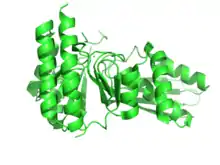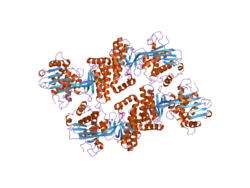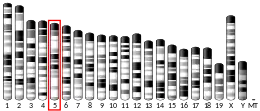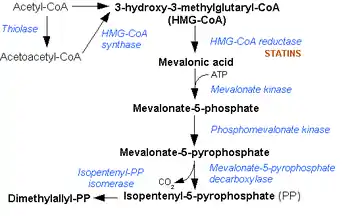Mevalonate kinase
Mevalonate kinase is an enzyme (specifically a kinase) that in humans is encoded by the MVK gene.[6][7] Mevalonate kinases are found in a wide variety of organisms from bacteria to mammals. This enzyme catalyzes the following reaction:
| Mevalonate Kinase | |||||||||
|---|---|---|---|---|---|---|---|---|---|
 | |||||||||
| Identifiers | |||||||||
| EC number | 2.7.1.36 | ||||||||
| CAS number | 9026-52-2 | ||||||||
| Databases | |||||||||
| IntEnz | IntEnz view | ||||||||
| BRENDA | BRENDA entry | ||||||||
| ExPASy | NiceZyme view | ||||||||
| KEGG | KEGG entry | ||||||||
| MetaCyc | metabolic pathway | ||||||||
| PRIAM | profile | ||||||||
| PDB structures | RCSB PDB PDBe PDBsum | ||||||||
| Gene Ontology | AmiGO / QuickGO | ||||||||
| |||||||||
.

Function
Mevalonate is a key intermediate, and mevalonate kinase a key early enzyme, in isoprenoid and sterol synthesis.[6] As the second enzyme in the Mevalonate pathway, it catalyzes the phosphorylation of Mevalonic acid to produce Mevalonate-5-phosphate.[8] A 5-10% reduction in mevalonate kinase activity is associated with the mevalonate kinase deficiency (MVD) resulting in accumulation of intermediate mevalonic acid.[9]
Clinical significance
Defects can be associated with hyperimmunoglobulinemia D with recurrent fever.[10]
Mevalonate kinase deficiency caused by mutation of this gene results in mevalonic aciduria, a disease characterized psychomotor retardation, failure to thrive, hepatosplenomegaly, anemia and recurrent febrile crises. Defects in this gene also cause hyperimmunoglobulinaemia D and periodic fever syndrome, a disorder characterized by recurrent episodes of fever associated with lymphadenopathy, arthralgia, gastrointestinal dismay and skin rash.[6] The symptoms of the disease typically start at infancy and may be additionally triggered by stress or bacterial infection. Children with mevalonate kinase deficiency may remain undiagnosed for a long time as there is not enough scientific data at the moment to accurately diagnose children with the disease.[9]
See also
References
- PDB: 2X7I; Oke M, Carter LG, Johnson KA, Liu H, McMahon SA, Yan X, et al. (June 2010). "The Scottish Structural Proteomics Facility: targets, methods and outputs". Journal of Structural and Functional Genomics. 11 (2): 167–80. doi:10.1007/s10969-010-9090-y. PMC 2883930. PMID 20419351.
- GRCh38: Ensembl release 89: ENSG00000110921 - Ensembl, May 2017
- GRCm38: Ensembl release 89: ENSMUSG00000041939 - Ensembl, May 2017
- "Human PubMed Reference:". National Center for Biotechnology Information, U.S. National Library of Medicine.
- "Mouse PubMed Reference:". National Center for Biotechnology Information, U.S. National Library of Medicine.
- "Entrez Gene: mevalonate kinase".
- Schafer BL, Bishop RW, Kratunis VJ, Kalinowski SS, Mosley ST, Gibson KM, Tanaka RD (July 1992). "Molecular cloning of human mevalonate kinase and identification of a missense mutation in the genetic disease mevalonic aciduria". The Journal of Biological Chemistry. 267 (19): 13229–38. PMID 1377680.
- Mulders-Manders CM, Simon A (July 2015). "Hyper-IgD syndrome/mevalonate kinase deficiency: what is new?". Seminars in Immunopathology. 37 (4): 371–6. doi:10.1007/s00281-015-0492-6. PMC 4491100. PMID 25990874.
- Stabile A, Compagnone A, Napodano S, Raffaele CG, Patti M, Rigante D (December 2013). "Mevalonate kinase genotype in children with recurrent fevers and high serum IgD level". Rheumatology International. 33 (12): 3039–42. doi:10.1007/s00296-012-2577-z. PMID 23239036. S2CID 3220012.
- Online Mendelian Inheritance in Man (OMIM): 260920
Further reading
- Ma J, Dempsey AA, Stamatiou D, Marshall KW, Liew CC (March 2007). "Identifying leukocyte gene expression patterns associated with plasma lipid levels in human subjects". Atherosclerosis. 191 (1): 63–72. doi:10.1016/j.atherosclerosis.2006.05.032. PMID 16806233.
- Willer CJ, Sanna S, Jackson AU, Scuteri A, Bonnycastle LL, Clarke R, et al. (February 2008). "Newly identified loci that influence lipid concentrations and risk of coronary artery disease". Nature Genetics. 40 (2): 161–9. doi:10.1038/ng.76. PMC 5206900. PMID 18193043.
- Naruto T, Nakagishi Y, Mori M, Miyamae T, Imagawa T, Yokota S (2009). "Hyper-IgD syndrome with novel mutation in a Japanese girl". Modern Rheumatology. 19 (1): 96–9. doi:10.1007/s10165-008-0130-4. PMID 18941711. S2CID 25331505.
- Krisans SK (October 1992). "The role of peroxisomes in cholesterol metabolism". American Journal of Respiratory Cell and Molecular Biology. 7 (4): 358–64. doi:10.1165/ajrcmb/7.4.358. PMID 1356376.
- Houten SM, Wanders RJ, Waterham HR (December 2000). "Biochemical and genetic aspects of mevalonate kinase and its deficiency" (PDF). Biochimica et Biophysica Acta (BBA) - Molecular and Cell Biology of Lipids. 1529 (1–3): 19–32. doi:10.1016/s1388-1981(00)00135-9. PMID 11111075.
- Fu Z, Voynova NE, Herdendorf TJ, Miziorko HM, Kim JJ (March 2008). "Biochemical and structural basis for feedback inhibition of mevalonate kinase and isoprenoid metabolism". Biochemistry. 47 (12): 3715–24. doi:10.1021/bi7024386. PMID 18302342.
- Kathiresan S, Willer CJ, Peloso GM, Demissie S, Musunuru K, Schadt EE, et al. (January 2009). "Common variants at 30 loci contribute to polygenic dyslipidemia". Nature Genetics. 41 (1): 56–65. doi:10.1038/ng.291. PMC 2881676. PMID 19060906.
- Hager EJ, Gibson KM (November 2007). "Mevalonate kinase deficiency and autoinflammation". The New England Journal of Medicine. 357 (18): 1871–2. doi:10.1056/NEJMc072799. PMID 17978300.
- Marques-Vidal P, Bochud M, Paccaud F, Waterworth D, Bergmann S, Preisig M, et al. (August 2010). "No interaction between alcohol consumption and HDL-related genes on HDL cholesterol levels". Atherosclerosis. 211 (2): 551–7. doi:10.1016/j.atherosclerosis.2010.04.001. PMID 20430392.
- Lu Y, Dollé ME, Imholz S, van 't Slot R, Verschuren WM, Wijmenga C, et al. (December 2008). "Multiple genetic variants along candidate pathways influence plasma high-density lipoprotein cholesterol concentrations". Journal of Lipid Research. 49 (12): 2582–9. doi:10.1194/jlr.M800232-JLR200. PMID 18660489.
- Samkari A, Borzutzky A, Fermo E, Treaba DO, Dedeoglu F, Altura RA (April 2010). "A novel missense mutation in MVK associated with MK deficiency and dyserythropoietic anemia". Pediatrics. 125 (4): e964-8. doi:10.1542/peds.2009-1774. PMID 20194276. S2CID 24915125.
- Nakayama K, Bayasgalan T, Yamanaka K, Kumada M, Gotoh T, Utsumi N, et al. (June 2009). "Large scale replication analysis of loci associated with lipid concentrations in a Japanese population". Journal of Medical Genetics. 46 (6): 370–4. doi:10.1136/jmg.2008.064063. PMID 19487539. S2CID 35374041.
- Koné-Paut I, Sanchez E, Le Quellec A, Manna R, Touitou I (June 2007). "Autoinflammatory gene mutations in Behçet's disease". Annals of the Rheumatic Diseases. 66 (6): 832–4. doi:10.1136/ard.2006.068841. PMC 1954666. PMID 17213252.
- Weissglas-Volkov D, Aguilar-Salinas CA, Sinsheimer JS, Riba L, Huertas-Vazquez A, Ordoñez-Sánchez ML, et al. (February 2010). "Investigation of variants identified in caucasian genome-wide association studies for plasma high-density lipoprotein cholesterol and triglycerides levels in Mexican dyslipidemic study samples". Circulation: Cardiovascular Genetics. 3 (1): 31–8. doi:10.1161/CIRCGENETICS.109.908004. PMC 2827864. PMID 20160193.
- Simon A, van der Meer JW, Vesely R, Myrdal U, Yoshimura K, Duys P, Drenth JP (March 2006). "Approach to genetic analysis in the diagnosis of hereditary autoinflammatory syndromes". Rheumatology. 45 (3): 269–73. doi:10.1093/rheumatology/kei138. PMID 16234278.
- Gattorno M, Sormani MP, D'Osualdo A, Pelagatti MA, Caroli F, Federici S, et al. (June 2008). "A diagnostic score for molecular analysis of hereditary autoinflammatory syndromes with periodic fever in children". Arthritis and Rheumatism. 58 (6): 1823–32. doi:10.1002/art.23474. PMID 18512793.
- Fogarty MP, Xiao R, Prokunina-Olsson L, Scott LJ, Mohlke KL (May 2010). "Allelic expression imbalance at high-density lipoprotein cholesterol locus MMAB-MVK". Human Molecular Genetics. 19 (10): 1921–9. doi:10.1093/hmg/ddq067. PMC 2860891. PMID 20159775.
- Nair AK, Young MA, Menon KM (July 2008). "Regulation of luteinizing hormone receptor mRNA expression by mevalonate kinase--role of the catalytic center in mRNA recognition" (PDF). The FEBS Journal. 275 (13): 3397–407. doi:10.1111/j.1742-4658.2008.06490.x. PMID 18494797. S2CID 25641224.
- Deo RC, Reich D, Tandon A, Akylbekova E, Patterson N, Waliszewska A, et al. (January 2009). "Genetic differences between the determinants of lipid profile phenotypes in African and European Americans: the Jackson Heart Study". PLOS Genetics. 5 (1): e1000342. doi:10.1371/journal.pgen.1000342. PMC 2613537. PMID 19148283.
- Junyent M, Parnell LD, Lai CQ, Lee YC, Smith CE, Arnett DK, et al. (September 2009). "Novel variants at KCTD10, MVK, and MMAB genes interact with dietary carbohydrates to modulate HDL-cholesterol concentrations in the Genetics of Lipid Lowering Drugs and Diet Network Study". The American Journal of Clinical Nutrition. 90 (3): 686–94. doi:10.3945/ajcn.2009.27738. PMC 2728650. PMID 19605566.
External links
- mevalonate+kinase at the US National Library of Medicine Medical Subject Headings (MeSH)
- PDBe-KB provides an overview of all the structure information available in the PDB for Human Mevalonate kinase





